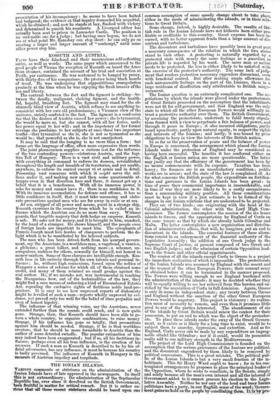KOSSUTH AND AUSTELL Parrs have their falsehood and their unconscious
self-reflecting satire, as well as words. The same paper which announced to the good people of 'Vienna the reception of ICossuth on board the Ame- rman steamer, contained the account of his trial and conviction at Pesth, par eontumace. He was sentenced to be hanged by with thirty-five of his companions ; the proxies being black of wood. He was undergoing that supposititious strangulation precisely at the time when he was enjoying the fresh breezes of the sea and liberty. The contrast between the fact and the figment is striking—be- tween the deadly, malignant, choking figment, and the health- ful, hopeful, breathing fact. The figment may stand for the ob- stinately blind view of Austria, which refuses to see anything. in- consistent with her own old predominance; a Viennese view of the universe, strictly confuted in the fact. The figment is a confession too that the desires of Austria exceed her power : she is tyrannical, she would be more so, but she cannot, with all her forces, make her power equal to her will ; and in the impotency of her formal revenge she proclaims to her subjects at once these two important truths—that tyrannical as she is, she is not so tyrannical as she would be ; that powerful as she is, she is not omnipotent. It may be said that the hanging is no more than a form : but forms are the language of office, often more expressive than words. The joint pluenomenon supplies a curious test for the influence of the two contending powers—victorious Austria and the fugi- tive Tell of Hungary. Here is a vast civil and Military power, with everything at command to enforce its decrees, reestablished tlueu out the length and breadth of its territories, and yet unable,
an ere, to enforce its control except vi et armis and in detail. Possessing vast resources with which it might serve the mil- lions under it, and making now and then some questionable at- tempts even in that direction here and there, it cannot get up a belief that it is a beneficence. With all its immense power, it asks for money and cannot have it ; there is no confidence in it. With its immense accumulation for defence and offence, it has so little confidence in itself, that it must take unceasing and elabo- rate precautions against men who are far away in exile or at sea.
At sea, stripped of all power and means, guest in a strange ship, Kossuth exercises in the country from which he is exiled an in- fluence which the Austrian can do no more than envy. Without guards, that tangible majesty that doth hedge an emperor, Kossuth is safe. He asks not for money, and it is brought to him, unasked, by the hand of a stranger. He shows himself, and the people even of foreign lands are impatient to meet him. The sycophants of Francis Joseph must hire hordes of claequeurs to perform the de- light which is to be manifested by his beloved subjects.
The man who has been driven forth from his n govern- ment, say the Austrians, is a 'worthless man, a vagabosig,e:. vaurien, a plebeian ; a great talker, and nothing more ; a schemer, un- scrupulous, reckless for others, cowardly for himself; not honest in money-matters. Some of these charges, are intelligible enough. Kos- suth rose in life entirely through his own talents and personal in- fluence ; he, without high connexions, forced upon the nobles of Hungary a series of reforms for which all of them obtained some credit, and many of them retained no small grudge against the real author. . He, if we mistake not, was instrumental in teaching the Hungarians how, out of the technicalities of the law, they might find a sure means of enforcing a kind of Encumbered Estates Act, repealing the exclusive rights of fictitious noble land-pro- prietors. It is easy to see how unproved reports of dishonesty might be levelled at such a man—reports wholly unproved by evi- dence, yet proved only too well for the belief of class prejudice and even of honest bigotry.
The influence of that winning voice; say the Austrians, never extended further than the sounds could reach, and is now quite gone. Strange, then, that Kossuth should have been able to go- vern a whole count-iv, to organize combinations, to raise money Strange, if his infience has gone so totally, that precautions against him should be needed. Strange, if he is that worthless creature, that he should be more formidable to Austria than the author Of some detected swindle. The popular estimation of him may indeed have been exaggerated; but if so, all his factitious in- fluence, perhaps even all his true influence, is the creation of his accusers. If such a man as Kossuth is described to be by his of- ficial adversaries, has any influence, it must be because his country is badly governed. The influence of Kossuth in Hungary is the r measure of Austrian impolicy and turpitude.


























 Previous page
Previous page